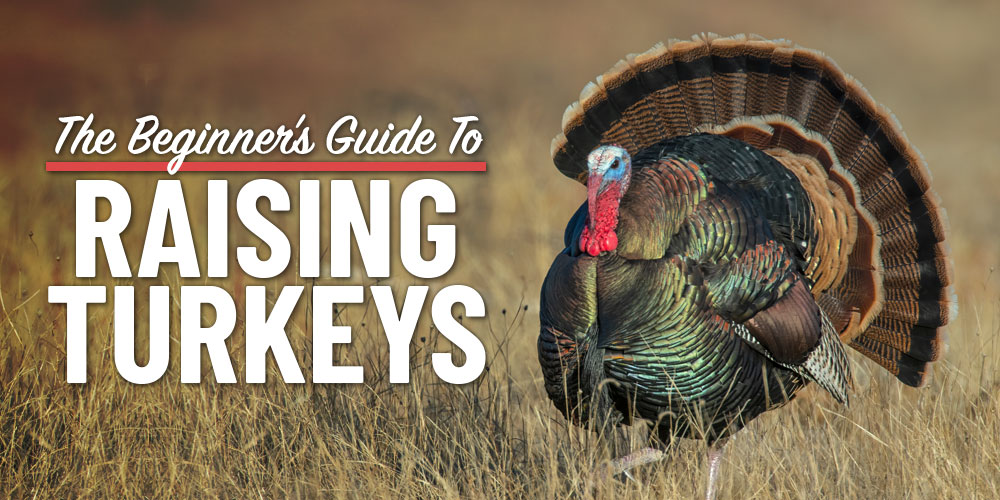
NAVIGATION
Raising turkeys has become a worthwhile venture for me on my homestead in North Carolina, where I have a small flock of five turkeys.
In this guide, I’ll share info on raising poults, how to choose a turkey breed, tips for building a shelter for turkeys, best practices for feeding turkeys, and how to prevent problems with your flock before they happen.
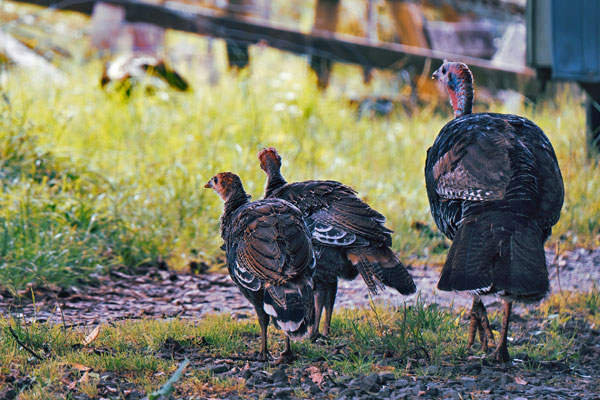

Hi, I’m Ryan
Deciding to raise turkeys was a natural next step for me on my homestead. Since I like to grow my own organic eggs, vegetables, and fruits, I was looking to add more organic meat into my slow-food lifestyle and started looking into raising turkeys for meat. Now my experience can help you start raising turkeys for greater control over your food sources — or just to have some pet turkeys to liven up and diversify the farm.

How To Raise Turkeys

Raising turkeys from delicate little poults to large, regal birds is fun and rewarding whether you have a large farm or a small backyard. It’s exciting to get started, but before you order your baby turkeys online or pick them up locally, there are a few things you should know, including how to keep your birds healthy and content with the proper supply of feed, fresh water, clean bedding, a dry, secure shelter, nesting boxes, and poles for roosting.
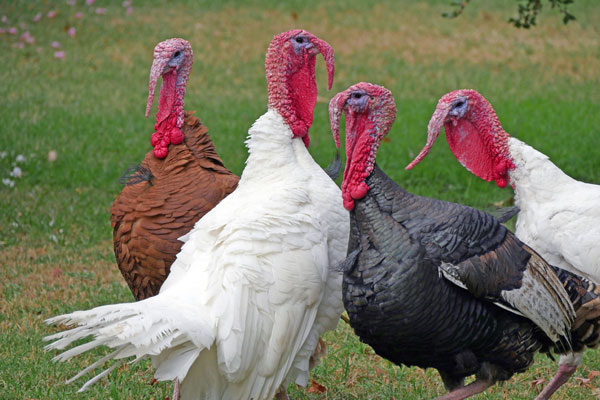 When I was learning how to raise turkeys, I found that being much bigger birds than chickens means turkeys require more of everything, including food portions, protein intake, and space accommodations. If you’re planning on raising turkeys and chickens at the same time like I’ve done, I recommend keeping them separate, especially if you are new to raising turkeys or chickens.
When I was learning how to raise turkeys, I found that being much bigger birds than chickens means turkeys require more of everything, including food portions, protein intake, and space accommodations. If you’re planning on raising turkeys and chickens at the same time like I’ve done, I recommend keeping them separate, especially if you are new to raising turkeys or chickens.
Turkeys in general, but young ones in particular, are prone to diseases that chickens can carry, so separating them helps decrease your risk of losing any poults to sickness.
Should You Raise Turkeys?

I suggest raising turkeys if you have enough space on your property, enough time to prepare for them and keep a close eye on them in their first few weeks of life, and a desire to raise turkeys either for their delicious meat and eggs or to keep them as pet turkeys around your homestead. Whatever your goal is, there are a few key considerations to keep in mind when deciding if turkeys are the right choice for you.
Pros And Cons Of Raising Turkeys
Personally, I love raising turkeys, but I’m fully aware of the pros and cons of adding more livestock to an already bustling homestead. You’ll want to consider the time, cost, and effort involved, as well as what returns you’ll see, to decide what’s right for your homestead. Investment and returns look different for everybody, so let’s look at some key factors affecting your decision.
Pros
- Turkeys are fantastic meat birds.
- Turkeys are cleaner than chickens.
- Turkeys are regal, loyal, docile, and capable of forming family bonds.
- Turkey eggs are healthy and delicious.
- It takes only 14 to 22 weeks to raise a turkey as a meat bird, depending on the breed and sex.
Cons
- Turkey poults are susceptible to weather and disease and need a lot of care.
- Turkeys are large birds and need a lot of space.
- Turkeys eat a lot of poultry feed because they grow so big.
- It can be hard raising turkeys for meat because they become loyal pets when given the chance.
- Turkey feed usually costs more than chicken feed, as it needs to be higher in protein.
Choosing A Breed

One of the most important decisions you’ll make when raising turkeys is choosing which turkey breeds to fit your homestead. Because I raise my turkeys primarily as meat birds, I tend to stick with breeds such as broad-breasted whites and bronzes and even some Bourbon reds.
On the other hand, if you’ve never considered raising turkeys as pets, you’re missing out. Having a few of these slow, majestic birds following you around like puppies is immensely enjoyable while you do your homestead chores. Breeds that are the most companionable are midget whites, Merriam’s, Bourbon reds, and Jersey buffs.
Examples Of Common Turkey Breed Choices
- Broad-breasted white
- Bourbon red
- Broad-breasted bronze
- Traditional bronze
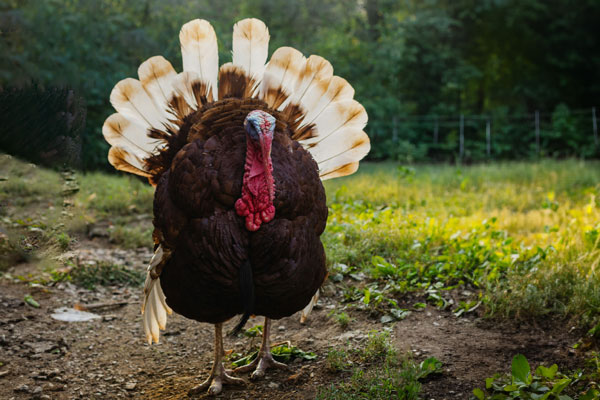
Outside of these breeds, there are many others to choose from — some are better egg layers while others are rarer, but there are a few breeds that tend to be the most popular with homesteaders.
Raising Turkeys From Poults

Once you’ve selected a breed, the first thing to know about raising turkeys is how to take care of turkey poults. Baby turkeys are delicate creatures, so before you bring them home, you’ll want to have a brooder set up with a heat lamp feeder and waterer that your chicks won’t easily dump or climb into. During their first weeks home, you’ll also need to keep a close eye on them to ensure they’re eating and drinking. You might need to lead them to their water and feed dishes and dip their beak into them to teach them where to get their sustenance.
Housing And Fencing Turkeys

Once your poults have all of their feathers, they’re ready to move to an outdoor shelter for turkeys, so you’ll need to learn how to build a turkey coop for your flock. When it comes to housing and fencing your turkeys, keep in mind that your little turkeys will grow into large birds that will need a lot of space, not only in their roosting area and coop but also in the yard. As they grow, turkeys require a lot of grass for grazing and fine gravel or coarse sand at the bottom of their coop or somewhere in their grazing area, which provides a needed aid to their digestive system when they start eating grass.
Feeding And Watering Turkeys

I learned how to raise turkeys just like I’ve learned every other aspect of homesteading — by doing research before getting in there to do the work. Learning what turkeys eat at every stage of their growing process is important because feeding and watering turkeys is different than feeding and watering chickens or any other type of poultry or livestock you might be raising.
 Turkeys younger than ten weeks need a poultry starter feed that’s 28% protein. From 10 to 20 weeks, your birds will need a grower feed of 20% protein, and after that, you can switch them to lay pellets of 16% to 18% protein.
Turkeys younger than ten weeks need a poultry starter feed that’s 28% protein. From 10 to 20 weeks, your birds will need a grower feed of 20% protein, and after that, you can switch them to lay pellets of 16% to 18% protein.
Once your turkeys are big enough to be outside, they’ll fill in a large part of their diet by eating grass and some grit in the form of sand or gravel, but they’ll always need a feed with high protein levels to support their continued health.
Just like your other livestock, turkeys will need to drink a decent amount of water daily, though how much they need will be in proportion to their weight and whether or not they’re laying eggs. I always recommend hanging waterers to prevent your turkeys from getting wet or spreading dirt or poop into their water.
Preventing Turkey Problems And Diseases

In my experience, the hardest part about raising turkeys is preventing problems and diseases when they’re still small poults. Turkeys are susceptible to chill, respiratory diseases, and other poultry diseases often carried by chickens. To prevent problems before they happen, I use hanging waterers to keep my chicks and adult turkeys from getting wet and chilled, and I raise my turkeys separately from my chickens to protect them from infection.
FAQ About Raising Turkeys

To wrap up what you need to know about raising turkeys, here are some more answers to frequently asked questions I’ve gotten about how to raise turkeys on the homestead.
Can I Raise Turkeys With Chickens?
Technically, yes, turkeys and chickens can live together, but there are a lot of considerations involved in raising turkeys with other types of poultry, and it’s not a decision you should come to lightly. As I’ve mentioned, turkeys are particularly susceptible to diseases carried by chickens, notably Blackhead disease, and raising turkeys with chickens can also lead to some brooding and coop problems. That said, I know several homesteaders who raise these two types of birds together due to space constraints, and they’re able to keep their flocks healthy through regular monitoring, keeping a clean, ventilated coop, and nutrition designed to target the needs of both turkeys and chickens.
Do Turkeys Need A Coop?
Turkeys do need a coop as a protected, dry space for roosting and plenty of nesting boxes for laying hens. I consider it an essential component to raising healthy turkeys, keeping them sheltered from the elements and safe from predators. As they’re much bigger than chickens, the coop, roosting spaces, and nesting boxes will need to be larger to accommodate the turkeys’ larger size.
When Should I Purchase Baby Turkeys?
This time frame will give most turkey breeds time to grow to the proper weight, though if you’re raising heritage breeds, you’ll want to purchase them a little earlier in May or early June, since they take longer to reach prime maturity. You have a little more flexibility on timing if you are raising pet turkeys or keeping them around for eggs.
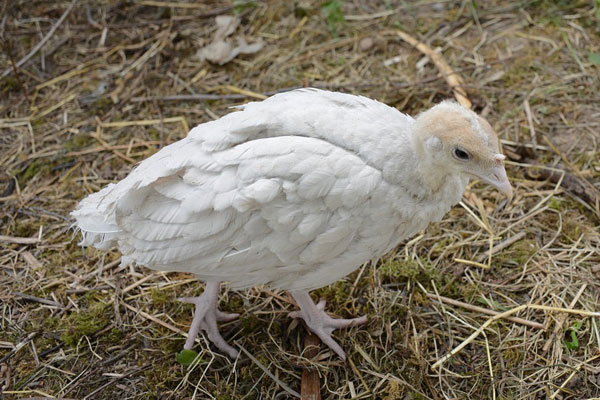
When Can Baby Turkeys Go Outside?
Baby turkeys can go outside when their feathers are finished coming in, which happens for most turkey poults between 6 and 8 weeks of age. Before this point, your little poults won’t have enough protection from the outdoor weather and will need a heat lamp to keep them from getting chilled.
When Is A Turkey Ready For Slaughter?
How long does it take to raise a turkey? I get this question a lot from homesteaders who are wanting to raise a small flock to help feed their family. Most turkey breeds are ready for slaughter between 14 and 19 weeks old, depending on the sex. If you’re raising turkeys for meat, your hens will most likely be ready to slaughter between 14 and 16 weeks of age, while your toms will take a little longer at 19 weeks.
Raising Turkeys For Eggs
Raising turkeys on my homestead has rewarded me with many tasty, organic meals to share with friends and family, supplementing my homegrown veggies and whole foods diet.
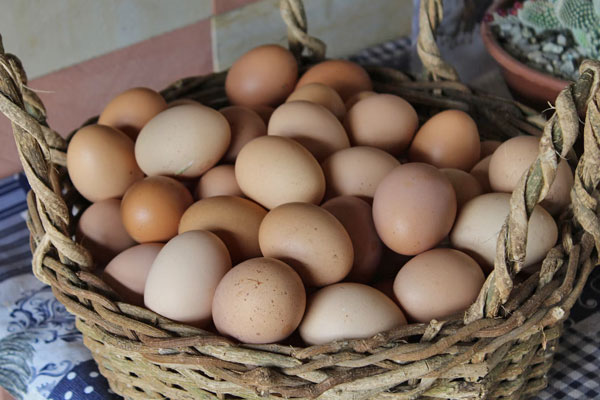
If you’re interested in adding turkeys to your farm, homestead, or backyard, I hope you feel better prepared and equipped to get started.
Your Turn!
- Do you think chickens or turkeys are easier to raise?
- Why do you want to raise turkeys?








Leave a Reply